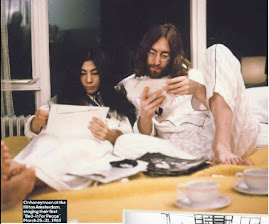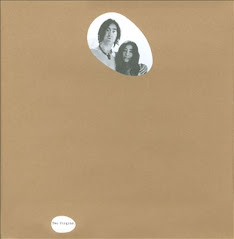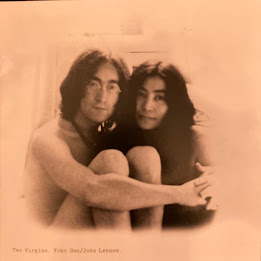The Lennon/Ono collaborative albums were a critical part of their take on celebrity coupledom. Their first two LPs carried the series title “Unfinished Music,” a conceptual gambit with deeper roots in the aesthetic of the Fluxus art movement than in that of the British Invasion. The first set to be issued, subtitled Two Virgins, was a sound-collage set reportedly produced during their first night together. The album’s name, and the full-frontal nudity of its cover, referenced the couple’s sense of innocence in approaching a new beginning—as well as the fact that the recording took place just prior to the consummation of their relationship.
 |
| Back Cover |
 |
| Lennon & Ono's Bed-In |
Rolling Stone Reissue Review
It's questionable whether anybody - other than perhaps John Lennon and Yoko Ono - has listened to Lennon and Ono's Wedding Album for fun at any point in the 50 years since it was first released, but that doesn't mean the album is without merit. It's interesting firstly as an audio version of an artistic happening, but it also acts as an intensely personal record of the era and their union. Originally released to celebrate the couple's March 1969 marriage, it features two tracks:
Side One is Lennon and Ono reciting each other's names in a variety of voices - whispers, screams, chuckles, wheezes - while their heartbeats form a minimal rhythm track. It's full of love and some humour, but it's also strangely aggravating.
Side Two contains snippets of song and conversation recorded at the Amsterdam bed-in. These have more of a political theme - in fact you could say Side One is love and Side Two is peace.
The album was originally packaged ornately by Apple designer John Kosh with photographs (see above), drawings, wedding certificates and more. This has been lovingly recreated by Sean Ono Lennon in the albums CD re-release - he even found the original company to reproduce the box it all came in.
There are copious reissues and pirates of this release. Genuine brown outer bags are full sized, covering the entire jacket within, and do not have a die-cut hole through which John and Yoko's faces can be seen. Nearly all copies were 'sealed' with a circular WHITE STICKER at the center of the brown bag's side-opening edge, which is usually split on open copies. Authentic brown bags with no trace of ever having been stickered exist, but are very rare - copies without the white sticker are almost certainly reissues or counterfeit issues from the 1970's or later.
This release includes a bonus track (previously unreleased) "Remember Love" (4:03)
Some Albums also came with 24" x 24" Black & White poster of John & Yoko planting a tree and an 8" x 8 ' Booklet with 6 pages that includes a drawing by John and 4 Pages of pictures of John & Yoko
This month's WOCK on vinyl post certainly belongs in the Weird category (musos call it Avantgarde) and should only be listened to once, in case permanent brain damage occurs. Download at your own risk. LOL
MP3 & Artwork: Two Virgins Link (44Mb)







































